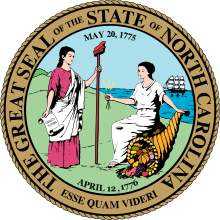David Settle Reid
| David Settle Reid | |
|---|---|
 | |
| Member of the U.S. House of Representatives from North Carolina's 3rd district | |
|
In office March 4, 1843 – March 4, 1847 | |
| Preceded by | William Henry Washington |
| Succeeded by | Daniel Moreau Barringer |
| 32nd Governor of North Carolina | |
|
In office January 1, 1851 – December 6, 1854 | |
| Preceded by | Charles Manly |
| Succeeded by | Warren Winslow |
| United States Senator from North Carolina | |
|
In office December 6, 1854 – March 4, 1859 | |
| Preceded by | Willie P. Mangum |
| Succeeded by | Thomas Bragg |
| Member of the North Carolina Senate | |
|
In office 1835–1842 | |
| Personal details | |
| Born |
April 19, 1813 Rockingham County, North Carolina |
| Died |
June 19, 1891 (aged 78) Reidsville, North Carolina |
| Political party | Democratic |
| Spouse(s) | Henrietta Settle |
| Relations |
Reuben Reid (Father) Elizabeth Settle Reid (Mother) |
David Settle Reid (April 19, 1813 – June 19, 1891) was the 32nd Governor of the U.S. state of North Carolina from 1851 to 1854 and a U.S. Senator from December 1854 to March 1859. His uncle was Congressman Thomas Settle, and his brother was Hugh Kearns Reid.
He was born in what would later be Reidsville, North Carolina, an unincorporated town named for his father, Reuben Reid. At age 16, David Reid became the first postmaster for the town. He studied law and was admitted to the bar in 1833. From 1835 to 1842, Reid served in the North Carolina Senate. He was a U.S. Representative from 1843 to 1847. Reid ran for governor in 1848 as a long-shot candidate. In his campaign, Reid promoted the now-obscure cause of "free suffrage," i.e. that there should not be different standards for who could vote for members of the North Carolina House of Commons and of the North Carolina Senate. This surprised his fellow Democrats; Michigan had begun electing governors by popular vote since 1836, and no Democrat had won under the new system. It was assumed that more voters would only increase the Whig domination of the state, but the Whigs denounced suffrage reform as "a system of communism unjust and Jacobinical." To everyone's surprise, Reid lost to Charles Manly by only 854 votes. In 1850, Reid defeated Manly by 2,853 votes, becoming the first elected Democratic governor of North Carolina.[1]
In the Senate, Reid was chairman of the Committee on Patents and the Patent Office. He sought but was denied a full term in the Senate when he lost a three-way internal party fight with Thomas Bragg and William W. Holden in 1858. He returned to the practice of law and was a delegate to an 1861 peace convention to try to prevent the American Civil War. Reid was a member of a state constitutional convention in 1875.
Reid died in Reidsville in 1891 and is buried in Greenview Cemetery in the same city.
References
External links
- United States Congress. "David Settle Reid (id: R000144)". Biographical Directory of the United States Congress.
- History of Reidsville
- David Settle Reid at Find a Grave

| United States House of Representatives | ||
|---|---|---|
| Preceded by William H. Washington |
Member of the U.S. House of Representatives from North Carolina's 3rd congressional district March 4, 1843 – March 4, 1847 |
Succeeded by Daniel M. Barringer |
| Political offices | ||
| Preceded by Charles Manly |
Governor of North Carolina 1851–1854 |
Succeeded by Warren Winslow |
| United States Senate | ||
| Preceded by Willie P. Mangum |
U.S. Senator (Class 2) from North Carolina 1854–1859 Served alongside: George E. Badger, Asa Biggs and Thomas L. Clingman |
Succeeded by Thomas Bragg |

